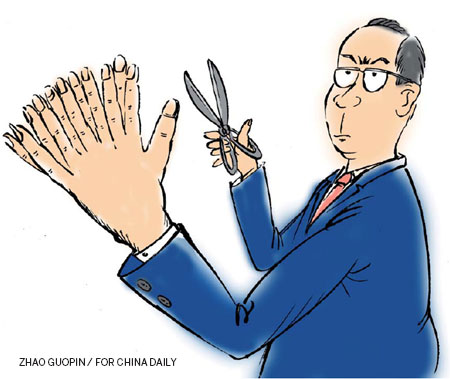A step in the right direction
Updated: 2013-03-22 09:02
By Zhou Feng (China Daily)
|
|||||||||||

China must press ahead with more government reforms to reap future dividends
Action and inaction are often the words used by experts to differentiate the government functioning in China and the United States.
Though this differentiation does veer toward exaggeration, it does however, reveal the stark differences in the functioning of the two governments. In China, the government is big while the market is small, whereas it is the other way round in the US.
But that seems to be changing as China is now looking to press ahead with a small government. Though the recent attempt to streamline the cabinet by creating mega-ministries seems to be a move in the right direction, it is something that needs sustained efforts in the long run.
The recent cabinet revamp, the sixth in three decades, makes the State Council headed by Premier Li Keqiang the smallest in terms of the ministries it has under it. To be precise, it has 25 ministry-level departments, two fewer than in the previous government.
But the downsizing makes sense, as it will help eliminate overlaps, cut red tape and prevent government departments from passing the buck.
The merger of the Ministry of Health and the National Population and Family Planning Commission into one unit is expected to bring more conveniences to residents, at least to those who would apply to have a second child.
According to earlier media reports, a couple who are eligible to have a second child need to collect 40 signatures from different government departments before they get the permit to have a second child. This situation is expected to improve after the merger of the two departments.
Other recent restructuring moves also have their reasons. Combining two media regulators, one focusing on press and publication and the other on radio, film and TV, is an answer to the times as media groups are operating across various platforms these days.
Incorporating the agency that oversees electricity with the National Energy Administration is also a wise step, as electricity is an important cog in the energy sector that needs to be administered under a single authority.
The State Oceanic Administration has been given more power under the new reforms. Non-military sea patrolling done by several departments including the Ministry of Public Security, the Customs and the Ministry of Agriculture, is now concentrated under one administration.
The change is also in line with China's growing ocean ambition and comes at a time when Beijing is embroiled in sea disputes with a few neighbors. Transferring the sea patrolling job to a single agency helps serve China's goal of reinforcing its control over the disputed waters.
The function of regulating pig slaughter was transferred from the Ministry of Commerce to the Ministry of Agriculture. It seems to be a reasonable change, considering that commerce officials know trade aspects better, but certainly are less informed than their counterparts in the Agriculture Ministry on matters relating to animal welfare.
The most significant of all the recent changes was the decision to dismantle the Ministry of Railways, or as some experts put it the "last fortress of the planned economy". The regulatory function of the railways has been transferred to the Ministry of Transport, while a new company, China Railway Corp, will run its commercial operations.
For years, the Ministry of Railways has been running an independent empire. It used to have its own police force, policymaking body and business entities. Dubbed "Big Brother Railway", it was not only a regulator, but a player and a supervisor too.
That all-roles-in-one scenario made the ministry a hotbed of corruption and an example of poor efficiency. The weakness of the ministry was exposed in a slew of incidents that included the investigation of former minister Liu Zhijun for commercial irregularities, and the Wenzhou high-speed train crash that killed 39 people in 2011.
Past experiences have proven that dismantling a powerful ministry can boost the reform and development of the sector it used to regulate.
The regulation and operation of the post and telecom sector was earlier under a single ministry. It was after the ministry was scrapped that China's telecom industry really started to take off and went on to pursue several market-oriented reforms.
It is reasonable to expect that China's railway sector will also develop on a healthy track after the ministry of railways becomes a thing of the past. Although, the newly incorporated China Railway Corp that inherits the commercial part of the ministry still monopolizes the railway operation business, the separation of the regulatory power and the commercial operation can help strengthen supervision and reduce the possibilities of corruption.
However that does not mean that all is well in this round of restructuring.
Today's Top News
List of approved GM food clarified
ID checks for express deliveries in Guangdong
Govt to expand elderly care
University asks freshmen to sign suicide disclaimer
Tibet gears up for new climbing season
Media asked to promote Sino-Indian ties
Shots fired at Washington Navy Yard
Minimum growth rate set at 7%
Hot Topics
Lunar probe , China growth forecasts, Emission rules get tougher, China seen through 'colored lens', International board,
Editor's Picks

|

|

|

|

|

|





